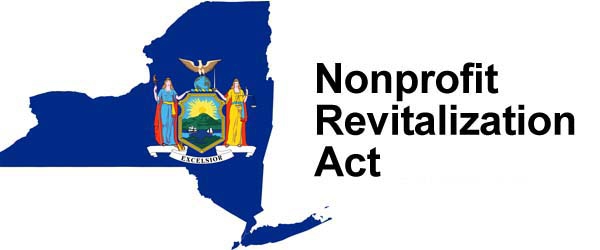Thought Leadership E-Articles |
NYS Nonprofit Revitalization Act Passage

As discussed earlier in 2013, NYS Attorney General Eric Schneiderman originally proposed the Nonprofit Revitalization Act, based on recommendations drafted by the 32-member Leadership Committee for Nonprofit Revitalization. The bill passed both houses of the state’s legislature on June 21, 2013 (the last day of the legislative session before summer recess) with overwhelming bipartisan support, and was signed into law by Governor Cuomo on December 19, 2013, taking effect on July 1, 2014. The Act updates and modernizes many clauses of New York nonprofit corporation law and adds new responsibilities of organizational oversight to enhance the board governance practices within the sector. The most significant changes are outlined below.
Mandated Audit and Review Process – A nonprofit organization that is registered to solicit and collect funds for charitable purposes is currently required to have certified audits if their revenue and support is at least $250,000. In order to lessen the financial burden on smaller nonprofits, thresholds will be increased to be more consistent with other states. That threshold will increase to $500,000 effective July 1, 2014. These same organizations currently have a $100,000 threshold for financial statements reviews, which will be increased to $250,000 on the same date. As of July 1, 2017, the audit threshold will increase to $750,000, while financial statement reviews will be required for entities with between $250,000 and $750,000 in such receipts. Lastly, as of July 1, 2021 the certified audit threshold increases to $1 million, while financial statement reviews will be required for entities with between $250,000 and $1 million in such receipts.
Audit Oversight – The Act will require that the board, or a committee of the board, be responsible for retaining the outside auditor and reviewing findings with the auditor.
Conflict of Interest Policies – All nonprofit organizations will be required to adopt a conflict of interest policy that defines what constitutes a conflict and outlines procedures for approving and disclosing such conflicts. Newly elected board members will have to complete a conflict disclosure as well as annual declarations of members on a ongoing basis.
Whistleblower Policies – Nonprofits with twenty or more employees and annual revenue of over $1 million must enact a whistleblower policy that complies with the Act.
Board Change – Nonprofit employees, including its CEO, will no longer be able to serve as chair of the board or hold a position with similar responsibilities.
Electronic Communications – Electronic transmission of board and membership meeting notices, waivers of notice and votes requiring unanimous written consent will be allowed, as well as board and committee meeting participation by videoconference.
Eliminate Corporate “Types” – This will create two categories of corporations: charitable and non-charitable. The Act will “grandfather” nonprofits that have already formed as a particular type (A, B, C, or D) so that they will not have to file any new paperwork or amend any contracts.
Expedite Approval of Mergers and significant Property Transactions – The Act will allow nonprofits seeking to merge or sell assets the option of obtaining approval from the Attorney General in lieu of court approval. This will allow many transactions to go through one step instead of two.
If you have any questions regarding the Nonprofit Revitalization Act, please contact your nonprofit professional at Dermody, Burke & Brown.
DB&B…Educating to Empower
The information reflected in this article was current at the time of publication. This information will not be modified or updated for any subsequent tax law changes, if any.
